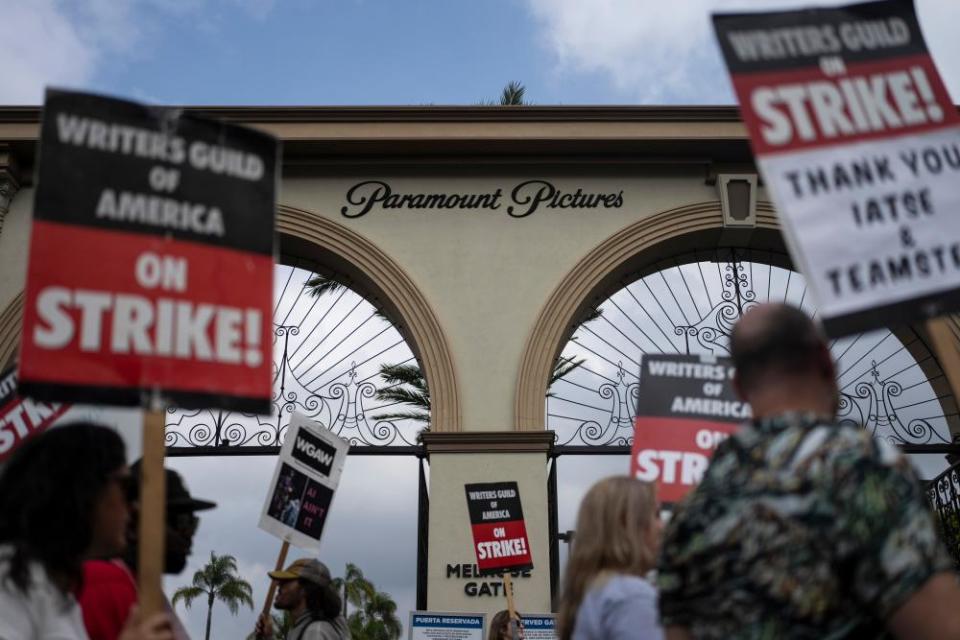Hollywood writers agree to end five-month strike after new studio deal

Hollywood writers are officially ending their five-month strike, after union leaders approved an agreement made with the Alliance of Motion Picture and Television Producers and sent the full details of the new contract to union members for ratification.
The Writers Guild of America (WGA) said in a statement on Tuesday evening that writers would be free to work starting after midnight local time, while a ratification vote takes place on a new three-year contract with Hollywood studios that won concessions on writers’ payment, terms with streaming shows, and the use of artificial intelligence.
Negotiators for the Writers Guild of America (WGA) and an alliance of studios, streaming services and production companies reached a tentative agreement on Sunday after five marathon days of talks.
Related: Is the Hollywood writers’ strike over? The provisional deal explained
On Sunday, the WGA hailed the three-year agreement as “exceptional – with meaningful gains and protections for writers in every sector of the membership”.
Late-night and daytime television are expected to return to the air quickly. But most TV and film production cannot yet resume as the actors’ strike is still under way, and the strikes have already affected the production and release schedules for the coming months.
The move brings a dramatic chapter in Hollywood to a close after the strike – one of the longest in the industry’s history –brought productions to a halt, sending shock waves across Los Angeles and beyond.
In May, the WGA voted overwhelmingly to authorize its 11,500 members to strike for the first time in 15 years amid stalled negotiations with major studios. Writers argued they were receiving worse pay and less stable work in the online-streaming era. The union also demanded additional protections around studios’ use of artificial intelligence.
Writers spent months on picket lines outside major studios from Los Angeles to New York, including Amazon, Netflix, Paramount and Warner Bros. A few months after the writers began their strike, the Hollywood actors’ union Sag-Aftra undertook similar action in what amounted to a historic “double strike”, the first such action in over six decades.
The writers’ strike, which lasted 146 days, was just five days shy of becoming the longest strike in the guild’s history.
A summary of the deal with studios was made public on Tuesday. Writers won concessions across multiple areas they said were crucial, including residual payments for shows on streaming platforms, more transparency on viewership numbers for streaming platforms like Netflix, minimum numbers of writers for pre-development “mini rooms” and guidelines for the use of artificial intelligence.
Members are set to vote on the deal between 2 and 9 October.
The agreement with the WGA came after negotiators renewed talks following a months-long impasse. Four top industry executives – Bob Iger, the Disney CEO; David Zaslav, the Warner Bros Discovery CEO; Ted Sarandos, the Netflix co-CEO; and Donna Langley, the NBCUniversal Studio group chair took part in this week’s negotiations.

The end of the Hollywood actors’ strike may not be on the horizon yet, but the deal for writers has ignited a new spirit of optimism and animated those who are still picketing. The deal could provide a path forward to resolve the actors’ strike, as the WGA agreement addresses concerns similar.
“For a hot second, I really thought that this was going to go on until next year,” said Marissa Cuevas, an actor who has appeared on the TV series Kung Fu and The Big Bang Theory. “Knowing that at least one of us has gotten a good deal gives a lot of hope that we will also get a good deal.”
Writers’ picket lines had been suspended, but they were encouraged to walk in solidarity with actors, and many were on the lines on Tuesday, including Mad Men creator Matthew Weiner, who picketed alongside friend and “ER” actor Noah Wyle as he has throughout the strikes.
“We would never have had the leverage we had if Sag had not gone out,” Weiner said. “They were very brave to do it.”
Striking actors have also voted to authorize their leadership to potentially expand their walkout to include the lucrative video game market, a step that could put new pressure on Hollywood studios to make a deal with the performers who provide voices and stunts for games.
The Screen Actors Guild-American Federation of Radio and Television Artists announced the move late Monday, saying that 98% of its members voted to go on strike against video game companies if ongoing negotiations are not successful.
Some of the same issues are at play in the video game negotiations as in the broader actors strike that has shut down Hollywood for months, including wages, safety measures and protections on the use of artificial intelligence.
Lois Beckett and agencies contributed reporting


